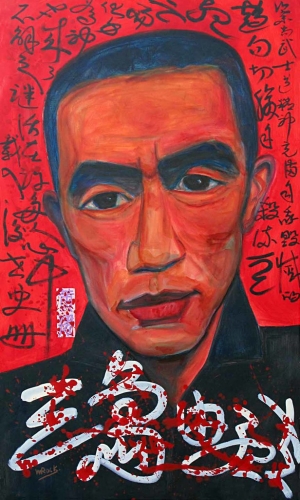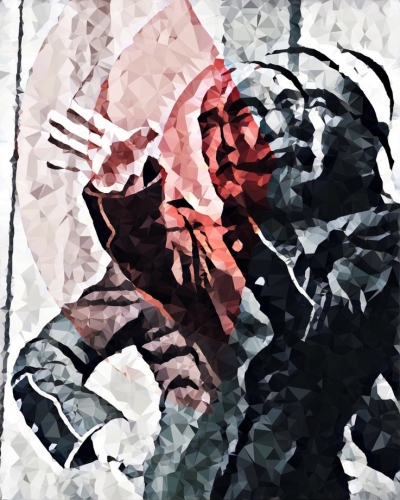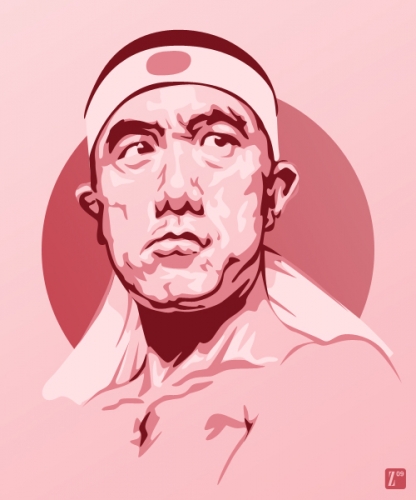I have read Andrew Joyce’s article “Against Mishima [2]” at The Occidental Observer with great interest and mixed feelings. I admire Dr. Joyce’s writings on the Jewish question, but to be candid, his critique of Mishima is on the whole tendentious and shallow. It is also overly emphatic on some topics while neglecting or downplaying other equally, if not more, important ones.
Dr. Joyce seems fixated on Mishima’s sexuality, which Joyce attributes to his unhealthy family environment and peculiar upbringing. Mishima’s sexuality is understandably regarded as unsavory by most traditional-minded people. But Dr. Joyce had gone a bit too far with his meticulous attention to this particular issue. Furthermore, I’m afraid that many of his claims about Mishima’s private life are based on taking his novel Confessions of a Mask as a straightforward autobiography, which is not supported by Mishima scholarship.
Mishima is certainly not a paragon of traditional sexual morality. That said, is he still worthy of the respect he receives from white nationalists? I believe the answer is yes, if we focus on the uplifting aspects of his life and work, including many of his writings and speeches that were given short shrift in Dr. Joyce’s article and perhaps are also generally less known to people who do not read Japanese.
The kernel of Dr. Joyce’s argument is that “if key aspects of his biography, including the death, are linked significantly more to his sexuality than his politics, then this is grounds to reconsider the worth of promoting such a figure,” which was later reinforced by his other claim that “a theory thus presents itself that Mishima’s carefully orchestrated death was a piece of homosexual sadomasochist theatre rather than anything political, let alone fascistic or in the tradition of the Samurai.”
To be frank, I found this assertion utterly preposterous. When a man delivers a speech about the importance of the Samurai tradition, then kills himself Samurai-style by cutting open his stomach—literally “spilling his guts”—it seems perverse to wonder if he is being insincere, if he is engaging in “homosexual sadomasochist theatre.” Irony, camp, and theatrics are all fake. There is nothing ironic or campy or fake about actually killing oneself.
Joyce simply ignores the text of Mishima’s final speech, in which he decried the ugly post-war era of Japan, deploring its materialistic and spiritually vacuous society. He lambasted venal and cowardly mainstream politicians. He called for Constitutional reform. He highlighted the authenticity of the Japanese military tradition, contrasting it to the miserable reality of the Japanese Self-defense Force, pointing out the dishonor of the Japanese military forever being a mercenary force of America and capitalists. He rejected the hypocrisy and nihilism of the post-war democracy and its mantra of “respect for human lives.” He reasserted the paramount status of the Tennō (Emperor) and Dentō (tradition), and urged the audience to die as real men and warriors combating the nation-wrecking post-war political regime and value system.
Then he demonstrated that he meant it.
The speech remains every bit as pertinent, powerful, and inspiring when read today as it was back then. The speech alone is enough to guarantee the immortality of Mishima as a nationalist figure of global significance, to say nothing of his numerous politically and culturally themed writings, fiction and non-fiction alike, and his other relevant speeches, which Dr. Joyce was either unaware of or chose to ignore.
A central argument of Dr. Joyce against Mishima is that “he seems hardly political at all. His fiction, denounced by early critics of all political hues as full of ‘evil narcissism’ possessing ‘no reality,’ is almost entirely devoid of ideology.” This could not be further from the truth and seems based on sheer ignorance. I wonder how many works of Mishima Dr. Joyce has actually read or even read about? Did he ever read Mishima’s final speech in full, or his Anti-Revolutionary Manifesto?
Admittedly, Mishima was not a political theorist or a philosopher; he was primarily a novelist and playwright. But being a nationalist writer and activist, his literary world was rich in themes drawn from Japanese history, traditional culture, politics, and current affairs. And, when it comes to political and ideological relevance, it is accurate to understand Mishima more as a Right-wing artist and inspirational activist than a theorist, which certainly has value for the Dissident Right in the West.
 Dr. Joyce maintained that “Mishima, of course, never explored the Emperor’s role in World War II in any depth, and his chief fixation appears solely to have been the decision of the Emperor to accede to Allied demands and ‘become human.’” This is a baffling statement which again simply betrays Dr. Joyce’s lack of knowledge. Besides rightfully decrying the Showa Emperor’s self-demotion to “become human” from his traditional status of “Arahitogami” (god in human form or demigod), Mishima also critically examined the Emperor’s role in politics before, during, and after the war, which revealed that what Mishima essentially venerated was not the individual Tennō but the Kōtō (the unique and time-honored Japanese monarchical system).
Dr. Joyce maintained that “Mishima, of course, never explored the Emperor’s role in World War II in any depth, and his chief fixation appears solely to have been the decision of the Emperor to accede to Allied demands and ‘become human.’” This is a baffling statement which again simply betrays Dr. Joyce’s lack of knowledge. Besides rightfully decrying the Showa Emperor’s self-demotion to “become human” from his traditional status of “Arahitogami” (god in human form or demigod), Mishima also critically examined the Emperor’s role in politics before, during, and after the war, which revealed that what Mishima essentially venerated was not the individual Tennō but the Kōtō (the unique and time-honored Japanese monarchical system).
For example, Mishima criticized the Showa Emperor, expressing strong sympathy with the rebel soldiers of the “2.26 Incident” of 1936, who were genuine patriots with lofty ideals who were mercilessly crushed by the explicit order of the Emperor. His Patriotism and Voice of the Martyrs were written with great feeling in commemoration of them. [1] [3]
Mishima also extolled the spirit and actions, and lamented the defeat of, the Samurai bands (prototypes of the movie The Last Samurai) who held fast to traditional values in defiance of Japan’s westernization in the wake of the Meiji Restoration. This is justifiably perceived as his criticism of the Meiji regime. Interested readers are recommended to take a look at my old review of the book Persona: A Biography of Yukio Mishima here [4].
Mishima believed that the Emperor could unify Japanese society as a cultural figure, standing above the political realm. He believed that if the monarchy stood as a national and cultural principle of unity, this would create a free space for political debate and cultural innovation, without endangering the cohesion of society. This view is rooted in Japanese tradition, but seeks to make space for important elements of modernity, including political pluralism and cultural freedom. One may agree or disagree with such views, but contra Joyce, they do exist, and they are not vague or vacuous.
A comprehensive search will discover that Mishima’s many books, essays, dramas, and speeches contain explicit or implicit messages defending Japan’s political, cultural, and military traditions, including but not limited to Bushido, expressed with the beauty and exuberance that are Mishima’s literary hallmarks and showing his profound cultivation in ancient Japanese and Chinese classics. His non-fiction books on cultural and political topics include For the Young Samurais, Introduction to Hagakure, Sun and Steel, and Theory of Cultural Defense. The same themes are discussed in his novel Runaway Horses and numerous essays. The five books cited above are especially popular and widely read in France and Italy.
In Sun and Steel (1968), Mishima writes, “Sword/martial art means to fight and fall like scattering blossoms, and pen/literary art means to cultivate imperishable blossoms.” Mishima has certainly lived up to this ideal himself, fulfilling it with his own sword and pen. According to literary critic Koichiro Tomioka, Sun and Steel is almost Mishima’s “literary suicide note” in which his cultural and philosophic thoughts were condensed. In it, Mishima argues that it is exactly the post-war era, in which all values have been inverted, that necessitates the revival of the ancient ethic code of “Bun-Bu-Ryodo” (cultivating a mastery of both pen and sword), as when “Bu” (sword) is gone, “Bun” (pen) slackens and decays. It is in the healthy tension created by the contrasting “Bun” and “Bu” that Mishima was seeking to reclaim traditional Japanese sensibilities.
Mishima also made some famous political statements in a long and heated debate with Leftist students at Tokyo University in 1969, the peak of a cultural and political maelstrom that had swept across Japan’s campuses at large. Their discussion went beyond different political stances into philosophical realms. While the students advocated transcending time and realizing a conceptual revolution in a new space, Mishima upheld the continuum of time. The topics included the Emperor, arts and aesthetics, ego and flesh, morality of violence, politics and literature, time and space, beauty as concept and reality, etc. While being an avowed and ardent Right-wing nationalist in politics and culture, Mishima actually showed sympathy with the Left-wing students’ opposition to capitalism and big business, telling the students: “If you guys are willing to recognize the sanctity and solemnity of the Emperor [as the head of the Japanese national community], I am willing join your ranks.”
Dr. Joyce also made a few jaundiced remarks that detract from his credibility. For example, he claims “[Mishima] was so poor at articulating his ideas to troops during his coup attempt that he was simply laughed at by gathered soldiers.” This is a surprisingly uninformed and erroneous assertion. It was true that Mishima was jeered and taunted by the gathered troops, who interrupted his speech multiple times by shouting. But their behavior had nothing to do with Mishima’s alleged inability to articulate his ideas. Mishima, after all, made a career of articulating ideas, a talent that did not fail him in his final speech.
The problem, rather, lies with the soldiers themselves, who understandably resented the fact that they were convened to listen to Mishima’s speech under duress because Mishima had taken their commander hostage. Moreover, most post-war Japanese servicemen were mere salarymen in a prosperous and materialistic society. They had little connection with the Japanese warrior tradition and were hardly capable of appreciating the problems of the spiritually vacuous society that had produced them. Mishima was perhaps aware of the possibility that he was “casting pearls before swine,” but he knew that his actions would give his words a far larger audience than the hecklers before him. Interestingly enough, according to a 2015 Mishima memorial in the Japanese nationalist publication Sankei Shimbun, some of the soldiers who mocked Mishima’s words later came around to his way of thinking.

Dr. Joyce states that “[Mishima] lied during his own army medical exam during the war in an effort to avoid military service.” This was simply not true. According to a number of Japanese books and essays on Mishima written by his supporters and critics alike, a large amount of evidence on this particular issue pointed to Mishima’s father Azusa Hiraoka using his government connections to help his son evade military conscription, about which Mishima was unaware. Another version of the story is that, although Mishima passed the initial exam, he was diagnosed with pulmonary infiltrates and was judged physically unqualified and excluded from military service, which was unsurprising due to his chronically weak physical conditions from early childhood.
Rather than chasing after such pointless shadows, it is far more worthwhile to take notice of the fact that Mishima had long felt pangs of conscience and an acute sense of survivor’s guilt for his inability to fight as a result of his physical condition in his youth, which partly explained why he took up body building after the war, striving to become a better man in both physical and spiritual senses, and entered the cultural and spiritual world of Bushido and the Samurai.
Another baseless and snide remark from Dr. Joyce is “One could add speculations that Mishima’s military fantasies were an extension of his sexual fixations, including a possible attempt to simply gain power over a large number of athletic young men. But this would be laboring an all-too-obvious point.” There is simply no evidence that Mishima harbored such baleful intent toward the young men who joined his Tatenokai (Shield Society). There has not been a single allegation of sexual impropriety, either before or after Mishima’s death, either from the young men themselves or from the media at large, including many hostile tabloid papers eager to pounce on the first possible chance to sling mud at Mishima. Surely one could expect that Mishima’s young followers, however juvenile and starry-eyed they might have been back then, would have said something in the last half-century if they had really become targets of Mishima’s “sexual fixations.”
Dr. Joyce moves from disparaging Mishima to demeaning Japanese culture in general in his misguided dismissal of Seppuku. Joyce’s major source, namely Toyomasa Fuse, is a Leftist who hates his ancestral cultural roots, like many Japanese and other East Asians who have either grown up in post-war American society or have been educated in toxic American institutions of higher learning. A simple search online reveals that Fuse was one of a select few Japanese groomed by the American occupation regime as a new intellectual elite. Fuse went to the US in 1950, sponsored by the US government, and later received both his Master’s and Ph.D. degrees from UC Berkeley, where he became a full-fledged Leftist and anti-traditionalist scholar. He was an active member of the anti-Vietnam War movement and moved from the US to Canada in 1968 with some other anti-war college professors. As the founder of the hilariously named Canada Suicide Studies Society, he specialized in and taught “Suicide Studies” at York University from 1972 until his retirement in 1997. Consulting Fuse on Japanese militarism is like consulting the Frankfurt School about Prussian militarism. Joyce, of all people, should know better.
The last sweeping and sloppy charge against Japanese culture by Dr. Joyce that I would like to counter is this: “Again, we must question, at a time when we are trying to break free from high levels of social concern and shaming in Europe, whether it is healthy or helpful to praise practices originating in pathologically shame-centered cultures.”
Surely Dr. Joyce realizes that social shaming in today’s Western countries is fundamentally different from social shaming in traditional Japanese society.
The shaming of whites in Western societies was imposed by an alien hostile elite on the native white populace for the purpose of undermining their traditional culture and values. But the shame culture of Japan is imposed by the Japanese community on its own members to encourage them to live up to communal standards and serve the common good. To put it simply, shaming in the West is an alien contrivance to undermine white society by pinning whites down with false guilt, while shaming in Japan is an indigenous and organic way that the Japanese maintain social norms and enhance social cohesion. The gradual decline of Japanese shaming culture in recent years due to Western influence is another trend that has alarmed traditionalists and nationalists in Japan.
If white societies had greater social cohesion and responsibility, reinforced by shaming, they probably would have resisted the takeover of hostile alien elites. Perhaps, then, white nationalists should study and adopt Japanese shaming mechanisms instead of bashing and trashing them. By calling traditional Japanese shame-centered culture embodied by Mishima “pathological,” Dr. Joyce might as well be quoting from the Frankfurt School, which sought to pathologize healthy white family and social norms, which are not so different from healthy Japanese norms.
Note
[1] [5] Two of the leaders of the uprising, senior captain Asaichi Isobe and senior captain Hisashi Kōno, evoked the greatest empathetic feelings from Mishima, and their patriotism, sincerity, and Samurai mettle became sources of his literary creations. Mishima wrote Patriotism and Voice of the Martyrs based on the Prison Note of Isobe, which featured the revengeful ghosts of the 2.26 uprising soldiers and Kamikaze pilots.
In a conversation with Tsukasa Kōno, elder brother of senior captain Hisashi Kōno, who was a key member of the uprising and committed suicide after the coup failed, Mishima remarks on the Showa Emperor’s dismissive words on the officers who decided to commit suicide: “Go ahead and kill themselves if they want. I’m not going to honor those despicable men with any official envoy.” Mishima commented: “It was not the rightful conduct for a Japanese Emperor. This is so sad.” Tsukasa asked Mishima: “Had those young officers known what the Emperor had said, would they have still shouted ‘Tennō Heika Banzai!’ (Long Live His Majesty the Emperor) before the firing squad?”
Mishima answered: “Even when the Emperor didn’t behave like an emperor, subjects ought to behave like subjects. They knew they must fulfill their part as subjects and chanted ‘Long Live the Emperor,’ believing in the judgment of the heaven. But what a tragedy for Japan!” When uttering his, he looked teary and his voice choked. After publishing Voice of the Martyrs, Mishima wrote in a letter to Tsukasa: “I wrote it with an intention to present it before the memorial tablets of your younger brother and other deceased officers of the 2.26 Uprising.”





 del.icio.us
del.icio.us
 Digg
Digg
Les commentaires sont fermés.